ASEAN Economic Bulletin Vol. 25/3 (Dec 2008)
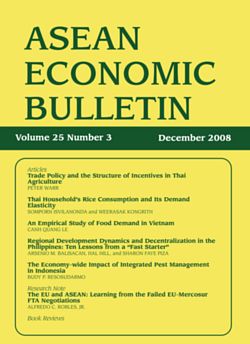
Date of publication:
December 2008
Number of pages:
106
Code:
AE25/3
Contents
-
ASEAN Economic Bulletin Vol. 25/3 (Dec 2008)
[Whole Publication] -
Preliminary pages
- ARTICLES
-
Trade Policy and the Structure of Incentives in Thai Agriculture, by Peter Warr, author see abstractAs Thailand has industrialized, successive Thai governments have become increasingly interested in assisting agricultural producers and processors. But the export orientation of Thai agriculture has limited the scope for protection policy as a means of influencing domestic commodity prices. This paper uses comparisons between the prices of agricultural commodities in domestic and international markets as a means of studying the magnitudes of these interventions. Thailand is unusual in that except for the cases documented in this paper, assistance to rural people has primarily taken the form of direct transfers and subsidized loans, rather than interventions in agricultural commodity markets.
-
Thai Households Rice Consumption and Its Demand Elasticity, by Somporn Isvilanonda, Weerasak Kongrith, authors see abstractThis paper analyses expenditure and price elasticities of demand for rice consumption in Thai households. The elasticities were measured from cross-sectional data of a socioeconomic survey conducted in 2002. The average rice consumption in Thai households was 101 kg/person/year. The overall expenditure elasticity of demand was positive but very inelastic. Households in urban centres had lower expenditure elasticity than those in the villages. Households in the highest 25 per cent of the income rank had a negative response to the expenditure variable for quantity rice demand but those households had a positive response for quality rice demand. Price elasticity was negative and inelastic. Households in urban areas are more sensitive to the rice price increase than those in the suburbs and villages. The results reflect the quality concern over rice consumption in Thai household consumption driven by the country's rapid economic growth and urbanization. A strategic policy for rice in Thailand should more focus on development of high-quality rice.
-
An Empirical Study of Food Demand in Vietnam, by Canh Quang Le, author see abstractThis paper uses a linear approximation of Almost Ideal Demand System (AIDS) and extended AIDS models to investigate food consumption in Vietnam using the Vietnam Living Standard Survey (VLSS) in 2004. In particular, AIDS models are estimated to calculate income and price elasticities for three different components of food categories. Our results suggest that rice food and meat/fish are normal goods, while non-rice food is luxury. Household characteristics such as age, gender, and education do not appear to affect food consumption significantly, while urban/rural location is important. These results may give empirical evidence for policy-makers to design food policy in Vietnam.
-
Regional Development Dynamics and Decentralization in the Philippines: Ten Lessons from a Fast Starter, by Arsenio Molina Balisacan, Hal Hill, Sharon Faye A Piza, authors see abstractSpatial disparities, regional dynamics and centre-region relations are the focus of much attention in the developing world, owing to growing analytical and policy interest, concern over deeply entrenched spatial inequality, transitions from economic crises or command economies, and the uneven effects of rapid global integration. Many countries are embarking on major decentralization programmes. This paper examines regional dynamics and decentralization with reference to the Philippines, a country well suited to such a study and from which other developing countries can learn lessons. The Philippines initiated a major decentralization programme relatively early (1991), and it is one of the most spatially diverse countries in the world. The reforms occurred in the wake of a deep economic crisis, and were accompanied by a major liberalization programme.
-
The Economy-wide Impact of Integrated Pest Management in Indonesia, by Budy Resosudarmo, author see abstractThe excessive use of pesticides to control pests in Indonesia during the 1970s and 1980s caused serious environmental and human health problems. To overcome these environmental problems, from 1989 till 1999 the Indonesian Government actively adopted a strategy of integrated pest management (IPM). The general objective of this research is to analyse the impact of the IPM programme on Indonesian economy and household incomes for different socioeconomic groups.
- RESEARCH NOTE
-
The EU and ASEAN: Learning from the Failed EU-Mercosur FTA Negotiations, by Alfredo C Robles, Jr, author see abstractIn May 2007, the EU and ASEAN agreed to launch negotiations for an FTA. In entering the negotiation process, it is obvious that the EU has learned lessons from its failed negotiations with Mercosur. Thus the EU sought to ensure that there was a consensual basis for the (positive) assessment of an FTA's consequences, and it insisted on setting a deadline for the negotiations. ASEAN has to learn two lessons from the EU-Mercosur experience. First, there is a difference between the EU's rhetoric and the reality of the negotiations. Second, there is a wide gap between the possible negative consequences of FTA and the assistance that the EU may offer to enable countries, firms and workers to cope with these consequences.
- BOOK REVIEWS
-
BOOK REVIEW: East Asian Visions: Perspectives on Economic Development, edited by Indermit Gill et al., by Robert L Curry, Jr., author
-
BOOK REVIEW: Vientiane: Transformations of a Lao Landscape, by Mark Askew, William S. Logan and Colin Long., by Pavin Chachavalpongpun, author
-
BOOK REVIEW: Arndts Story: The Life of an Australian Economist, by Peter Coleman, Selwyn Cornish and Peter Drake., by Anthony L Smith, author
-
BOOK REVIEW: Multinational Corporations in Indonesia and Thailand: Wages, Productivity, and Exports, edited by Eric D. Ramstetter and Fredrik Sjholm., by Francis E Hutchinson, author
-
BOOK REVIEW: Land in Transition: Reform and Poverty in Rural Vietnam, by Martin Ravallion and Dominique van de Walle., by Moe Thuzar, author

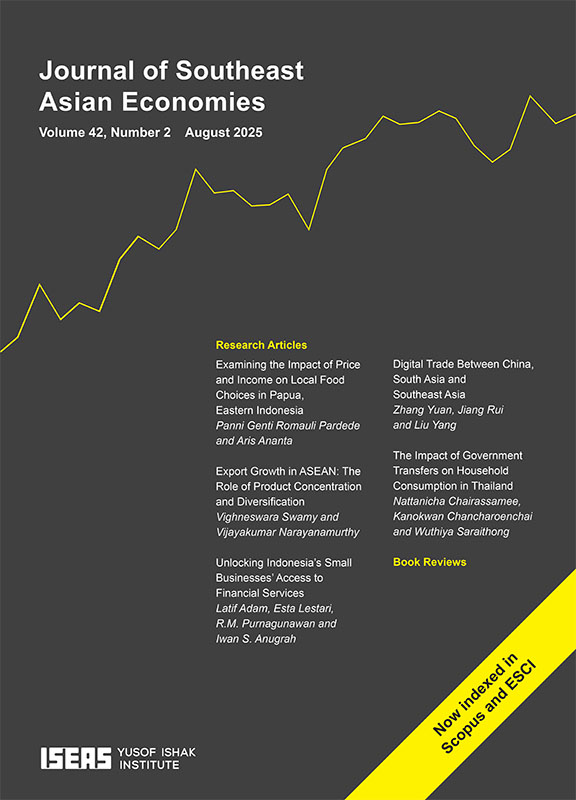
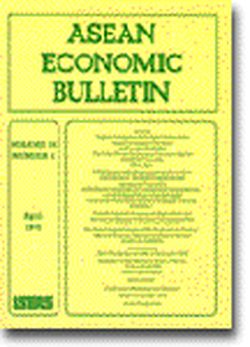
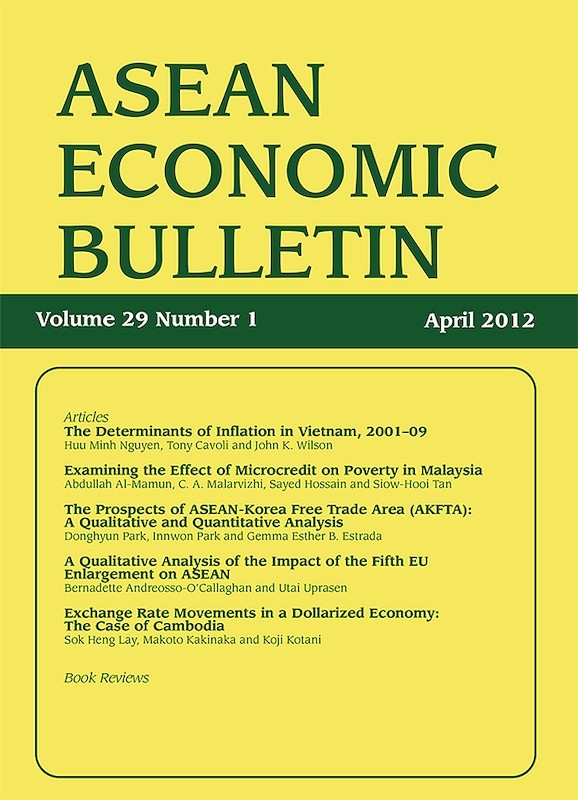
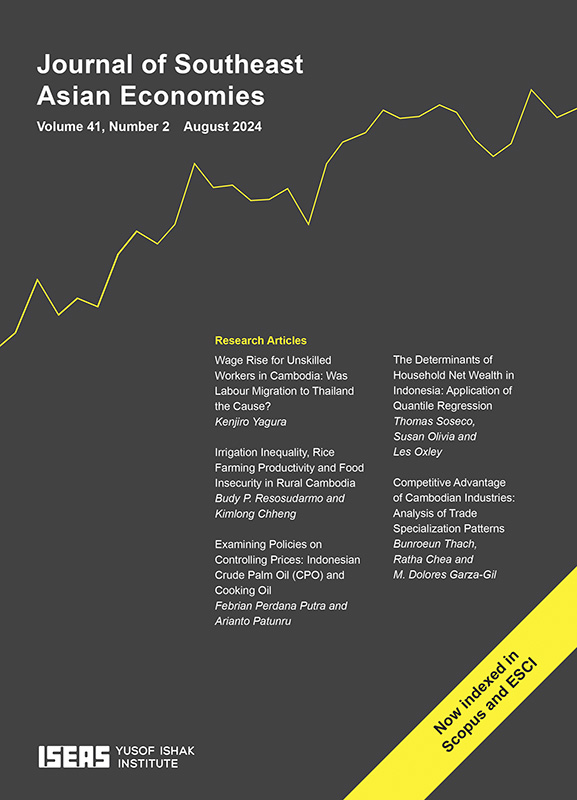
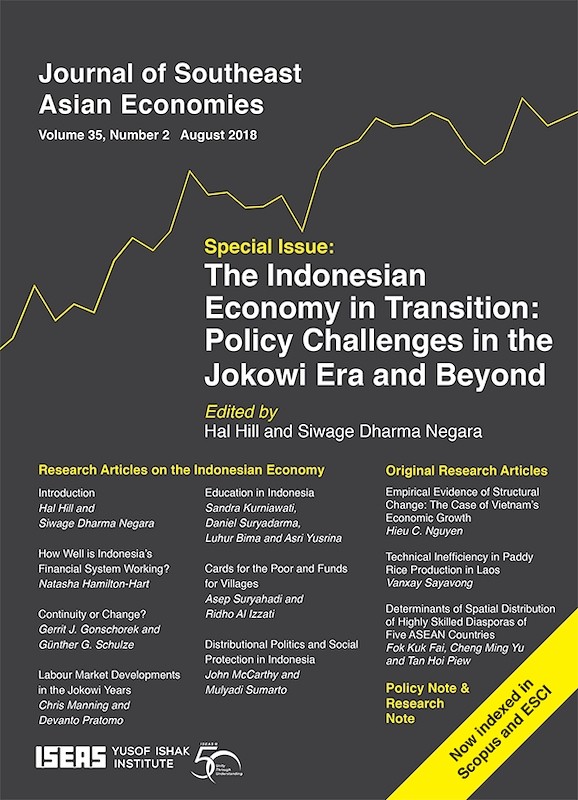
![Journal of Southeast Asian Economies Vol. 30/1 (Apr 2013) [formerly ASEAN Economic Bulletin]](/cover/AE30-1.jpg)